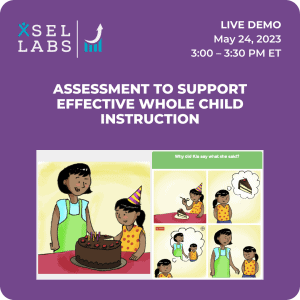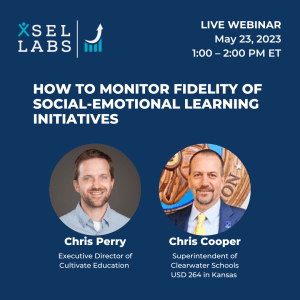Since I received my PhD, I have worked hard to unlearn the copious amounts of jargon endemic to the social sciences. Don’t get me wrong: The right jargon can be an economical way to pack a lot of information in a small package. The problem is that our shorthand often takes on different meaning for different people. When it does that, it confuses rather than clarifies.
Let’s take two related terms from the field of social emotional learning (SEL): evidence-based SEL and data-informed SEL. I hear these terms used more or less interchangeably. But here’s the thing. They’re not the same. And both are really important to the practice of SEL and to the development of the field.
→ Download Guide to Data-Informed SEL Instruction
Evidence-Based Social Emotional Learning (SEL)
So what is evidence-based SEL? Evidence-based SEL programs are those that have demonstrated evidence of efficacy in the context of rigorous field trials. The best efficacy studies randomly assign schools to receive an SEL program or not, a study design that is called a randomized control trial, or RCT. The quality and intensity of SEL program implementation in the “intervention” schools are monitored closely. Measures of student academic, social, behavioral, and emotional functioning are collected before and after the intervention. When students in intervention schools perform better than students in the control schools on those measures, the SEL program is “evidence-based.” One RCT is good; replication is better.
Evidence-based SEL program can be found in the CASEL Program Guides. Some argue that the conditions of an RCT do not reflect routine practice and discount the findings from RCTs. It is true that routine practice is different and that simply implementing an evidence-based program does not guarantee positive outcomes. For students to benefit, to the extent possible, evidence-based programs should be implemented with the same attention to quality and intensity as an RCT.
Others argue that rigidly administering an SEL program without consideration of the local context and culture is unrealistic and undesirable. That is why the best educators creatively adapt SEL materials so they are relevant to their setting and students.
Despite the limitations of an evidence-based approach to SEL, in my view, it is hard to imagine a better alternative. While an evidence-based program might or might not work in routine practice, a program that didn’t demonstrate a benefit in an RCT is not likely to work in any context. If I were an administrator trying to decide how to address the social and emotional learning needs of my students, I’d be strongly inclined to select from among the evidence based programs. I’d pick the program with evidence of efficacy that most fit the needs of my students and that would be most acceptable and feasible to my instructional team.
That would get me to the decision about what program to use—in other words, the beginning.
Data-Informed Social Emotional Learning (SEL)
If evidence-based SEL gets you to the starting line, data-informed SEL goes the rest of the way. Data-informed SEL involves using high-quality data to make decisions about how to teach what to whom, and to monitor growth. It involves periodic data collection and data review to inform instruction, to gauge progress, and to make mid-course corrections based on lessons learned. SEL data may focus on climate and adult practices, student competencies, or (in the best of all worlds) both.
Download Guide to Data-Informed SEL Instruction
Selecting an evidence-based SEL program is no guarantee of success. Some programs never get out of their shrink-wrap, so how could they possibly improve teaching and learning? Data-informed SEL is not a guarantee either, but I’d wager it improves the odds that your program will yield a demonstrable benefit. Why is that? An intentional focus on how a program is being used and how students are faring can help focus attention on what matters most, can guide instructional decision-making, and can lead teachers to teach the right skills to the right students at the right time.
Evidence-Based + Data-Informed
One of the things that differentiates SEL from other educational movements is—you guessed it—evidence and data. We know what works and what it takes to make it work. That doesn’t mean it’s easy, but it does mean that done well, SEL can make a measurable difference. In addition, increasingly, we have the assessment tools required for data-informed SEL.
As the field of SEL maintains a commitment to both evidence-based and data-informed SEL, it will continue to evolve and improve in ways that measurably benefit teaching and learning.
→ Download Guide to Data-Informed SEL Instruction




